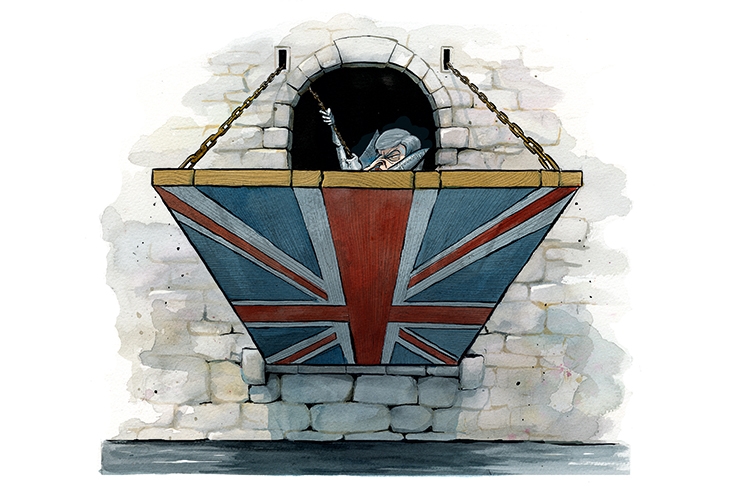Did any of us, whatever our opinions, expect the level of blustering indignation that has emerged since the 2016 referendum? It seems to be reaching ever new heights — or depths — of invective and reciprocal disdain. On one side, ‘fantasists, crackpots, dunderheads… jabbering braggarts’ (as a Telegraph columnist described Leave MPs last week). On the other, a gaggle of ‘enemies of the people’, cowards and time-servers.
Not so long ago, the sophisticated laughed that only a few eccentrics ‘banged on’ about Europe. Now we seem to have become a nation of head-bangers. As social media spreads extreme and insulting language far and wide, it is easy to think that we are in the midst of an unprecedented cultural war. Families are split, it seems, and old friendships ended. I’m reminded of the dramatic occasion in 1791 in the Commons when the Whig leader Charles James Fox and his friend and ally Edmund Burke fell out over the French Revolution.
But we don’t need to go back as far as the Terror — a real clash of cultures, and with thousands of corpses to prove it — to realise that our present tantrums are relatively trivial. The Suez Crisis of 1956, alluded to by Jo Johnson, was more bitterly divisive and more serious in its causes and consequences: a conspiracy to launch an illegal attack on another country, a full-scale invasion and a forced climbdown when sterling nearly collapsed. Or what about when our embassy in Dublin was burnt down by an angry mob in 1972? When the coal miners reduced the country to a three-day week in 1974 and destroyed the government? Or the ‘winter of discontent’ in 1978 when corpses could not be buried? When the Thatcher government was nearly blown up in 1984 in the biggest act of terrorism since 1605? Or the miners’ strike of 1985, with violence and arrests unequalled since the 19th century?
And now? We are planning to leave an international trading organisation and trying to work out our future relations with it. No invasions. No riots. No arrests. No bombs. Perhaps some queues at Dover and a temporary blip in our GDP. We do need, collectively, to take a lie-down in a darkened room.
And yet we are excited. We are angry. It is common to ascribe much of this anger to what many commentators identify as the core of Leave supporters, the so-called ‘left behind’: less educated, less well off, older people in depressed areas of the country, unemployed or underemployed — people who, their opponents insinuate, go round insulting foreigners and threatening MPs. On the Remain side too there is a ‘left behind’ core who shout and wave flags: sometimes younger, fairly educated, students or people in low-level public-sector jobs or precarious employment, unable to afford a house — people who feel that they are not rewarded according to their just deserts. These two groups would in other circumstances find themselves on the same side: for example, in a Corbynite Labour party.
But Brexit has divided them. Leavers still put their best hopes in the nation and its institutions. Remainer ‘left behinds’ have no confidence in a nation which they think undervalues them. The former fit into David Goodhart’s category of ‘somewhere people’, attached to the places of their birth and upbringing. The latter feel like ‘anywhere people’, identifying with (even if they are not really part of) an international cosmopolitan ideal, which they dimly associate with the EU. So attractive is this identity it seems not to matter what the EU is or does.
Yet not all the anger comes from the ‘left behind’ rank and file. Disdainful and divisive language is used by leading figures, particularly on the Remain side — by Messrs Blair, Major, Cable, Heseltine, Mandelson and others. But perhaps they too share the frustrations of the ‘left behind’. They must feel as Neville Chamberlain did in 1939: ‘Everything that I have worked for, everything that I have hoped for, everything that I have believed in during my public life, has crashed into ruins.’ We might understand their disappointment. But not when it leads to a blatant campaign to nullify democracy and sabotage government policy, with the risk of long-term damage to the country.
What do most British people feel deep down? Are we really divided down the middle into two warring camps? New opinion polls sporadically appear, none of them based on genuinely random samples, and hence none very reliable. But we can look back over a longer period in search of settled views. The EU’s own polling organisation, Eurobarometer, regularly showed that the British were among the least (and often the very least) enthusiastic for the ‘-European project’. They did not favour giving more powers to ‘Europe’. They did not believe that the EU was a success. They thought that Britain would be better off outside it. Strong support for EU membership in Britain was limited to about 5 per cent of the population. Few of those who voted Remain in 2016 said they were motivated by strong identification with the EU. Most were fearful of the economic consequences of leaving.
So although the country is divided, positive supporters of the EU are a small minority, even though a vocal and influential one. Most people are understandably worried and confused rather than militant. Even now, despite the barrage of alarmist propaganda unleashed for more than two years, the recent survey for Channel 4 indicated only about a third of those polled wanted to stay in the EU in the event of a ‘No Deal’.
Supporters of the EU, both in Britain and abroad, unanimously blame Britain’s lack of Euro-enthusiasm on ‘the tabloid press’ — another way of disparaging the Leave–voting majority. Europhiles would apparently prefer the British media, as in many European countries, to give uncritical support to the EU ‘project’, and play down its actual failures. But it cannot seriously be denied that British Euroscepticism (matched in other member countries now) is a reflection not of tabloid distortions but of the true condition of the EU, plagued as it is by economic instability and the rise of extremism. Consequently, the Remain campaign, both before and since the referendum, has not dared to make a positive case for EU membership. Instead it has relied on ‘Project Fear’ plus demonisation of Leavers (racist, white, old, uneducated, dupes, liars…) to launch a new form of identity politics. This is the main explanation of the anger on both sides.
What divides us deep down is a different attitude towards the nation — both towards the nation as a political concept, and towards our particular nation: in this context, the British. At the level of ideas, one side thinks that the sovereign nation is both bad (a cause of conflict) and obsolete (helpless in the face of globalisation) — a view common in Europe, though not in other continents. President Macron has asserted this repeatedly: ‘a sovereign Europe’, as he puts it, is the only organisation that can both protect Europe’s peoples from a threatening outside world and prevent them from being lured into nationalist extremism. The other camp regards the nation and national sovereignty as the essential basis of democracy, welfare and security, because only the nation can command the legitimacy and solidarity that make these things possible. This division exists across Europe and it is growing more inflamed.
In Britain — strange as it may seem, given our present excitableness — this division is less acute. I am convinced that if France or Germany (to take obvious examples) were to try to leave the EU, there would be blood in the streets. I suspect Macron thinks so too. In Britain, the idea of the nation is less tarnished by history — our modern national epic is the struggle against Nazism. Some on the left insist that Britain is nevertheless tarred by its imperial past, portrayed as wholly exploitative and destructive. Hence the accusation made by Sir Vincent Cable among others — in what has become habitually contemptuous language — that Leavers were motivated by ‘nostalgia for a world where passports were blue, faces were white, and the map was coloured imperial pink’.
The real connection between our history and our present discontents is more complex, and it affects ‘Remain’ rather than ‘Leave’. Part of our elite — political, administrative, diplomatic, intellectual — is still evidently possessed by a sense of national decline. Perhaps it is a convenient excuse for their own inadequacy. Whatever its explanation, ‘declinism’ seems to have become part of their emotional make-up: for them, Britain is weak, a failure, a dissolving state, un-able to subsist except inside a larger group. This is the British variant of that rejection of the nation that is visible in many European countries. It rests on a series of historical misunderstandings, above all a grossly inflated sense of Britain’s past importance compared with a highly exaggerated belief in its weakness today.
Declinism seems impermeable to argument and evidence, and it makes its holders unwilling to see the world as it actually is, and our place in it. We are, just as for the last few hundred years, one of the half–dozen or so most powerful and richest states. Yet declinists cling stubbornly to their pessimism, as if they need Britain to be the failure they proclaim it. This seems an indispensable part of the ‘Remainer’ mindset: the source of their confident predictions of disaster and their anger towards Leavers. The reason for this anger is that Brexit, ignoring their declinist rejection of the nation, expresses a hope — even an optimism — that Britain and its people can cope with the challenges and risks of our century, whereas the EU cannot.







Comments